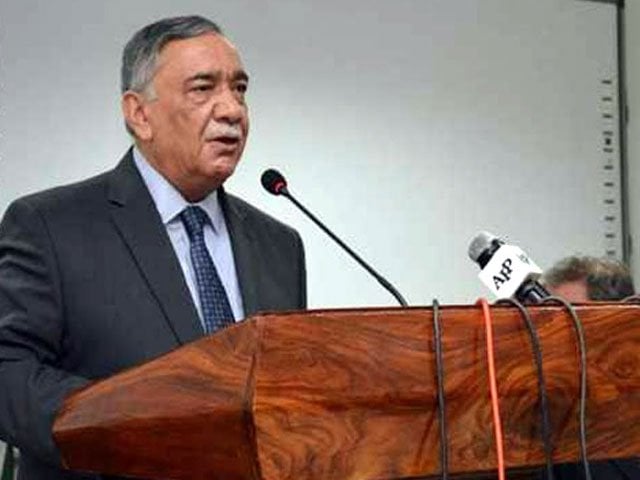
The chief justice who is also the chairman Law and Justice Commission of Pakistan (LJCP) in the Supreme Court was presiding over a meeting of Police Reforms Committee (PRC) on Monday.
The meeting was attended by Justice Gulzar Ahmed, serving IGPs from all four provinces, ICT, GB, AJ&K and former inspector generals Afzal Ali Shigri, (convener), Asad Jahangir Khan, Dr Shoaib Suddle, Tariq Khosa and designated director general of National Police Bureau to discuss the agenda items i.e. public complaints redressal mechanism, measures taken to improve quality of investigation and results, thereof, and enhancing the effectiveness of criminal justice system dealing with Anti-Terrorism Act (ATA) cases.
CJP Khosa welcomed the participants and appreciated the work done by police, while acting on the directions of PRC.
Mounted, anti-riot police force to merge for safety of citizens
LJCP Secretary Dr Muhammad Raheem Awan informed the participants that in public complaint redressal centres, 24,387 complaints were pending on January 1, 2019, 77,451 complaints were instituted, while 95,041 complaints were disposed of from January 1, 2019 to September 15, 2019.
Awan also spoke about the action taken against delinquent police officers/staff by imposing 144 major and 479 minor penalties during the said period.
He further said that 20,796 complaints regarding non-registration of FIR were filed out of which 19,123 were disposed of while 2,593 were still pending.
Speaking about the performance of the complaint cells, Awan gave comparative statement of writ petitions and petitions U/S 22A and 22B Cr.PC for current year i.e. January 1 to September 15 with the corresponding period for the last year.
Child sexual abuse: Kasur in spotlight yet again
LJCP secretary said that during 2018, 14,733 writ petitions were instituted in high courts, while from January 1, 2019 to September 15, 2019, 12,187 writ petitions had been instituted.
He said the figures reflected that 17.3% workload in filing writ petitions had been reduced from high courts due to effective performance of public complaints redressal centres.
He also presented the statistics of district judiciary stating that from January 1, 2018 to September 15, 2018, 186,567 petitions under section 22A and 22B were instituted, while from January 1, 2019 to September 15, 2019, 124,330 petitions had been instituted, which showed a reduction of 33.4% in filing of petitions U/S 22A and 22B Cr.PC.
Punjab IG Capt (retd) Arif Nawaz Khan spoke about the performance of police complaint redressal centres and the action taken against delinquent police officials.
Claims of reforms fail to rein in Punjab Police brutalities
Khan gave the details about the establishment and working of district assessment committees (DACs) and said that from January 1, 2019 to July 31, 2019, 31% accused had been convicted and 69% acquitted in 2,586 criminal cases decided in Punjab.
Chief Justice Asif Saeed Khosa expressed his concern over alarming rate of acquittal due to flaws in investigation.
All IGPs noted that DACs established across the county have the following composition: (i) a retired district and sessions judge having significant expertise in criminal cases (ii) SP investigation (iii) investigating officer (iv) prosecutor (v) senior lawyer having experience in criminal cases and a young lawyer.
The mandate assigned to DACs is to evaluate the judgments passed in murder cases and review cases of acquittal and bail.
CJP Khosa stressed upon the National Police Bureau to devise a uniform strategy across the country regarding correct narration of FIR, unnecessary arrests and false evidence so that misuse of power for registration of criminal cases could be discouraged.
Justice Gulzar emphasised on the need to build the confidence of public on police and said that police needed to play its role for improvement of law and order in the country especially in rural areas.

















COMMENTS
Comments are moderated and generally will be posted if they are on-topic and not abusive.
For more information, please see our Comments FAQ